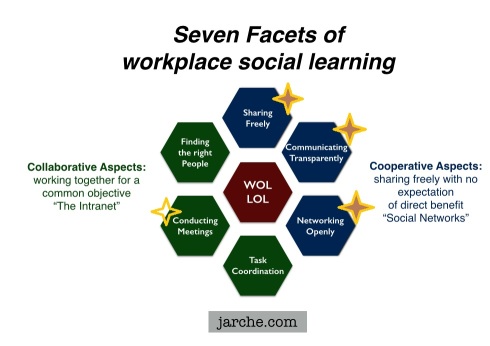We gather for our meeting. Some pull out laptop computers, others prefer pen and paper. We talk over our projects, progress, next steps, risk factors. It’s a scene that plays out every day, to the point where we barely think through the opportunity that each meeting might represent.
We head back to our desks or on to our next meeting. The most organized, resourceful, and determined among us will file notes into whatever organizing system we have devised. Perhaps they’ll reappear in the minutes before the moment of need, either as we work on that project or gather again. Rinse and repeat.
But what if we changed the cycle? What if those meeting notes were out in the open, cataloged for team members and colleagues—and managers and mentees—to find, save, share, and make sense of for their own personal knowledge management (PKM)? I’m proposing that we don’t just save our notes, but use them, share them, integrate them with others, and build both individual and organizational learning.
That kind of transparency has so many benefits:
- Notes become living documents to add to and glean from.
- Meetings are more focused, productive, and (maybe) less frequent when show your work/working out loud (#WOL) practices are systemically applied.
- Managers, stakeholders, and cross-functional coworkers can benefit from knowledge of and insights from the ongoing notes.
- Potential misunderstandings, cross-purposes, and redundancies can be avoided by sharing freely with teammates.
- New insights can be found in the notes “feed” from all our of organization’s ongoing work.
- It helps each of us make better sense of our daily activities.

Open note-taking hits several keys of Working/Learning Out Loud. Click image to read H. Jarche’s excellent post and source for this graphic.
I hear misgivings and concerns about this practice all the time, and here’s are the three most common:
- We already have too much information coming at us, and I can’t take any more inbox filler. There are many ways to manage information, and I recommend that you skip email notifications of any kind. Instead, use wikis, social feeds, SharePoint, ESNs, Google Docs, some project management and CRM tools, etc. It is not hard, and need not clutter; in fact, sharing this way will make long, substantive email chains unnecessary. Ultimately, this is a de-cluttering exercise.
- I don’t have time, and we already have too many reporting requirements. There’s the famous story of the delivery driver who claims he is too busy to change his flat tire as he clunk-a-clunks down the street. This is a new way of working, yes, but it doesn’t really require any new skills—you can simply take notes on a public platform instead of a private one. This may not satisfy your reporting requirements, but it will surely save you time when you have to create those reports, and may even make some reports superfluous.
- Isn’t that what a CRM system is supposed to do for us? A social CRM would indeed do this, at least in part. Few of us, however, have access to and use a CRM tool in this way. I certainly don’t. I invite those kind readers who do to let me know about it, for the benefit of all of us.
Heads of state (or their staff) take detailed notes and keep diaries to be made public after their terms of service, so that we might make sense of and learn from their decisions and insights. Few of us, however, deal in statecraft, classified files, or even sensitive information. We can benefit from these insights and knowledge today. As Jane Bozarth rightly says, “Share is the new save.” If you note it, there is a good chance others can benefit from it, too. Please, share the wealth.
In a future post, already in draft, I’ll discuss some tools and processes, and invite others to share how they’ve shared notes. But if you want to share your tips, no need to wait—I’ll include them in my post and give you credit (if you’d like it).

Leave a comment